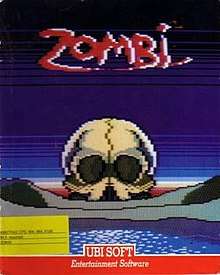Zombi (1986 video game)
Zombi is an icon-driven action adventure video game. It was Ubisoft's first publication, released in 1986.[1] It was programmed by Yannick Cadin and S.L. Coemelck, with graphics by Patrick Daher and music by Philippe Marchiset.
| Zombi | |
|---|---|
 | |
| Developer(s) | Ubi Soft |
| Publisher(s) | Ubi Soft |
| Designer(s) | Patrick Daher |
| Platform(s) | Amstrad CPC, Amiga, Atari ST, Commodore 64, MS-DOS, ZX Spectrum |
| Release | Amstrad CPC
|
| Genre(s) | Action adventure |
| Mode(s) | Single-player |
Gameplay
A first-person action adventure, it borrows heavily from the George A. Romero film Dawn of the Dead: four protagonists exploring a zombie-filled shopping mall, gunshops, escalators, and the articulated trucks used to block the entrances. If a character's health is depleted, he turns into a zombie, which then roams the room they died in. Zombies can be killed either by numerous body shots, or a single shot to the head. Characters are named after the creators of the game.
Ports
The game was re-released in 1990, with ports developed for the ZX Spectrum (by Geoff Phillips, Colin Jones and Steve Chance), Commodore 64 (Jean Noel Moyne, Laurent Poujoulat, Jean Francois Auroux),[2] Amiga (Alexander Yarmitsky),[3] Atari ST and MS-DOS (Yannick Cadin).
Reception
The ZX Spectrum version was awarded 87% by Sinclair User magazine[4] and 77% by Your Sinclair,[5] both reviewers were impressed with the immersive atmosphere.
CU Amiga awarded the Amiga version of the game 85%, whilst German magazine Amiga Joker scored it at 69%.[6]
Zzap!64 awarded the Commodore 64 version of the game 72%. The reviewer said that the gameplay is outdated and is very similar to Catch 23, a 1987 ZX Spectrum game.[7]
See also
- ZombiU, a similarly titled 2012 game from Ubisoft
References
- "Games, Games and More Games" article from Start magazine volume 3 issue 8, March 1989; retrieved from Atarimagazines.com
- Zombi at Lemon64.com
- Zombi at Hall of Light
- Sinclair User issue 98 at World of Spectrum
- Your Sinclair issue 52 at World of Spectrum
- Amiga Joker March 1990 and CU Amiga May 1990 reviews at Amiga Reviews (archive.org copy)
- "Zombi for Amiga (1990) MobyRank". MobyGames. Retrieved 24 November 2012.